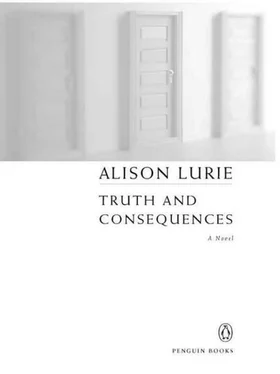In Bernie’s view, there was no reason for him or Alan to feel specially afflicted by fate. “We’ve had it too good all our lives, so when something like this happens we feel insulted and injured. In most other parts of the world, they’d think we were damn lucky to have survived.” Both he and Gilly believed that in fact there were many more sick people than well people anywhere, even in a relatively healthy environment like Hopkins County. “The thing is,” Bernie had explained, “people who are sick are in the hospital, or at home, where you can’t see them. And those who don’t stay home, the ones you might meet in the course of a day, even if they admit to a cold or a headache, a lot of them don’t let on if they’re chronically ill. Course, it’s different for me. Because I’m a vet, a lot of people want to tell me all about it, and they want me to suggest a treatment. I tell them, unless you’re a horse or a cow or a dog, nothing doing. I don’t want to lose my license.”
Gilly, though from a different perspective, concurred in this view of a world mostly composed of the ill. A lot of the people she met, especially her students, she said, were victims of an imbalance between body and mind. Her classes at Corinth University were largely remedial, and her students tended to be either athletes, recruited for their physical rather than their intellectual prowess, or those for whom English was a second or third language, who had had to study night and day to pass their courses. The former group suffered from overemphasis on the body, the latter from mental strain and lack of sleep and exercise.
Levering himself painfully off the sofa, Alan shuffled into the downstairs bathroom, where he peed and took half of another pill. Then he rolled up his shirtsleeves to inspect his latest symptom, a red, itchy rash on his forearms. Either Gilly or Bernie, he seemed to remember, had once complained of something like this. Maybe whichever one it was could recommend some kind of cream, or a good dermatologist. He returned to the kitchen, poured himself a glass of orange juice, and tore open a virgin bag of potato chips. If Jane were there she would give him her silent better-watch-your-weight look, but (he glanced out the kitchen window to check) she was still in the garden. And anyhow, so what? Eating, as Bernie had once remarked, was one of the few pleasures left when you had back trouble, and (unlike alcohol) wasn’t dangerous in combination with drugs.
Trailing crumbs,Alan passed through the dining room, taking the portable phone off its base, returned to the sofa, and began to dial. When neither of his new friends answered, he uttered a curse that was almost a sob. Hearing this unpleasant, shameful noise, a kind of darkness of self-disgust came over him. How had he gotten to this place in his life, where he was consumed with rage and despair because he couldn’t whine about his rash to other invalids, people he wouldn’t have even cared to know two years ago?
Alan had always had many friends, maybe he still did, but he didn’t want to see any of them. Once it became clear that his back wasn’t going to get better soon, they had begun to treat him in an awkward uneasy manner, as if he had joined a cult or been convicted of some embarrassing felony. It reminded him of a book he had read in college, Samuel Butler’s Erewhon, set in an anti-utopia where illness was a crime. Back then, Alan had assumed that was either a joke or a bid for more understanding of criminal offenders. Now he knew it was no more than the truth. To be briefly ill was merely a misdemeanor, like exceeding the speed limit or lifting a monogrammed towel from a hotel. People didn’t approve, but the slip was soon forgiven if not forgotten. Chronic illness made you into a chronic offender: even your best friends didn’t treat you the same as they once had. They were solicitous, but formal and uneasy, glad to see you but gladder to leave. Eventually even your own family was affected. “Danielle and the kids are bored with the whole thing of my back,” Bernie had once said. “They don’t want to hear about it anymore.”
Jane isn’t bored, Alan thought. She still cares, she wants to help. But there had been something strange in the way she had looked at him this morning out in the driveway, just for a second, almost as if she didn’t recognize him. And again later, when she brought him the icepacks, the same sort of look. As if she were seeing him from a great distance, and maybe not liking what she saw.
Only eleven in the morning, and he was exhausted. If he could read, it might distract him, but the Times had somehow fallen to the floor in disarray. He felt about with his hand, but could reach only the business section, which reminded him of the declining economy and the many medical bills he continued to receive for amounts not covered by his insurance. Meanwhile, he realized that the blue icepacks Jane had brought had softened and turned lukewarm and useless. Alan pulled them out from behind him with an impatient, agonizing wrench, and threw them on the floor. Then he lay heavily back, trying to decide if it was worth it to get up, carry the icepacks into the kitchen, put them into the freezer, remove the inferior white icepack, return to the sofa, and lie down again. All these actions would hurt, possibly more than the ice would help.
Maybe in a few minutes he would have the energy. Or maybe Jane would come in and he could ask her to do it. Meanwhile, he lay there, and the lizard continued to chew on his back.
THREE
On a hot late August afternoon at the Matthew Unger Center for the Humanities, things were not going well. Five professors were scheduled to move in the day after tomorrow ; but that morning a large piece of ceiling had fallen in the kitchen, filling much of the ground floor with dust and debris.
Jane had not been very surprised by this event. One of the things she knew by now was that for anyone in an administrative position, probably right up to the dean of the Arts College and the provost and president of the University, the question is always, “What is going to go wrong today, and how will I deal with it?” As her husband Alan had said of his own department chairmanship, “You take the job because you have ideas about how things could be better, and then you spend most of your time keeping them from getting worse.” Over the past few years she had learned to anticipate and even in a way to appreciate problems and their repair.
Jane usually got to the Center just after lunch. During the morning she was at her other job on campus, where she was the administrative secretary of the Humanities Council. There, in Knight Hall, she collected and issued announcements of lectures and conferences and prizes, scheduled campus events and conferences, interviewed students for work-study jobs, and sent out bulletins and e-mails. There were problems at Knight Hall too, but they tended to be smaller. Files were lost, mistakes were made in memos and bulletins, students did not go to their assigned jobs, and computers broke down.
But at the Center there was almost always, or seemed to be, a major crisis. For one thing, her assistant there, a young skim-milk blonde called Susie Burdett, was the sort of person to whom problems naturally seem to come, eager to cause alarm and worry. Susie almost appeared to enjoy reporting to Jane, for instance, that the copier had broken down again. When Jane asked if she had called Technical Services, the answer was always no. “I thought you might want to look at it first,” Susie would say, clasping her plump pink hands, whose nails were painted a different color every day.
Today Susie’s nails were a shimmery yellow-green, coordinating peculiarly well with her long blond hair, which always had a slightly greenish tinge from the chlorine in the college pool. Now her green nails held a wad of pink tissues to Susie’s nose, which quivered with a series of sneezes. The dust from the accident, she explained, had brought on an allergic reaction.
Читать дальше







![Кэмерон Доки - Правда и ее последствия[Truth and Consequences]](/books/79610/kemeron-doki-pravda-i-ee-posledstviya-truth-and-con-thumb.webp)




